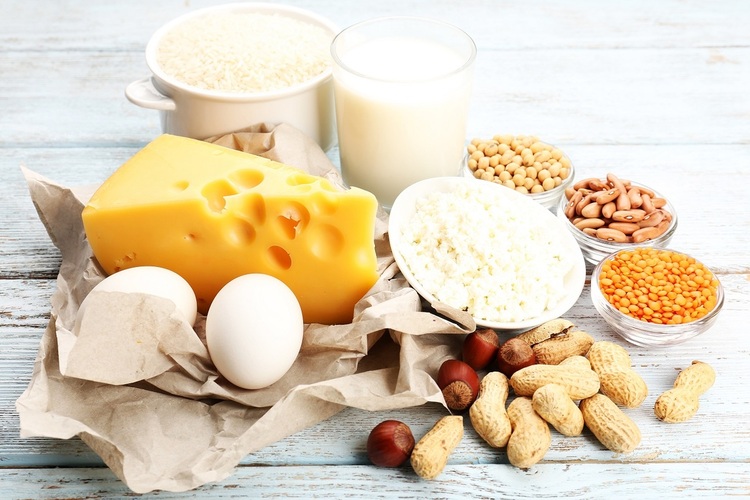
By Catarina Lynn
Catarina Lynn is a nutritionist at Nutrition Society of Malaysia.

During any meal of the day, protein-based dishes are often the highlight on the plate or table. Indeed, protein is an important part of our diet. But did you know that having the right amount and type of protein, alongside balanced carbohydrate and fat, can also help you to achieve healthy weight loss and maintenance?
What is protein?
Protein is one of the three types of macronutrients that we consume from our diet, other than fat and carbohydrate. It is made up of 20 amino acids that bind together in various combinations to form different types of protein (e.g. enzymes, hormones, antibodies, haemoglobin, etc.) that serve diverse functions in our body. These functions include:
- Tissue growth, maintenance and repair
- Supporting biochemical reactions (enzymes)
- Signalling and communication between cells (hormones)
- Providing structure (e.g. keratin, collagen)
- Maintenance of proper pH and fluid balance
- Immunity against infections (antibodies)
- Transportation and storage of substances (e.g. haemoglobin, casein)
- Energy supply
Protein is an essential part of a healthy diet. Besides the functions mentioned above, protein has also been shown to be beneficial for healthy weight management. To promote weight loss, it is important to pay attention to the type and quality of protein consumed. Protein quality can be determined by the composition of amino acids in the protein and the type of protein sources.
How can protein help with weight management?
1. Reduce hunger and increase satiety
Protein provides satiety and tends to promote a feeling of fullness, improve appetite control, and thus reduce hunger and help us to curb overeating. Many studies have shown that people start eating less overall once they start adding protein into their diet. Plus, an increased protein intake can help to reduce cravings and snacking at night.
Many Malaysians also agree with the facts as reflected in the APAC Generation Gap Breakfast Habits Survey conducted by Herbalife Nutrition in 2021. 50% of Malaysians think that a higher-protein breakfast helps with weight management. And among these Malaysians, 66% agree that protein helps keep you fuelled up until your next meal or snack, while 49% agree that protein helps satisfy hunger and reduce cravings for salty, fatty foods.
This happens because protein intake reduces the level of the hunger hormone ghrelin, while at the same time, boosting satiety hormones (e.g. GLP-1, cholecystokinin) that reduce hunger and appetite. Thus, with adequate protein in the diet, you tend to eat fewer calories, hence facilitating weight loss.

2. Boost metabolism and burn more calories
Protein has the highest thermic effect of food (20-30%) compared to carbohydrate (5-10%) and fat (0-3%). The thermic effect of food refers to the percentage of calories used for digesting and metabolising the food. The higher thermic effect of protein means that calories from protein are burned more efficiently.
Due to the higher thermic effect and other factors, adequate protein intake also tends to boost overall metabolism and increase the amount of calories burned by the body. Studies have shown that a high-protein diet makes you burn an extra 80-100 calories per day. Hence, having sufficient protein intake helps you to burn more calories and lose weight.
3. Prevent muscle loss and metabolic slowdown
When you lose weight, you also tend to lose some muscle mass leading to a decreased metabolic rate. What you want is to lose more body fat (subcutaneous and visceral fats) instead of muscle mass. Consuming adequate protein can help build muscle, prevent muscle loss and boost metabolism even as you lose weight, especially when combined with strength training exercises.
4. Reduce stress
Increased and prolonged stress can affect sleep, blood sugar and hormone levels and lead to emotional eating, which can result in weight gain. Consuming protein-rich foods is crucial to produce neurotransmitters such as dopamine and serotonin that can help improve mood, reduce stress and prevent depression. A diet rich in protein also helps you reduce cravings for foods high in sugar, which can trigger anxiety and depression when taken in excess.
5. Keep blood sugar from climbing up
Consuming only carbohydrates can cause blood sugar to spike up. If you are regularly having high blood sugar levels, there’s a chance of developing insulin resistance, causing less sugar to be taken up by the body. You’ll also have higher levels of insulin in the blood. These factors can prevent fat from your adipose tissue from being mobilised and used as fuel source. Having a combined meal with some protein and fats can keep blood sugar from climbing up.
How to get enough protein?
Firstly, how much protein should you get? Daily recommended protein intake may vary depending on age, sex, how active you are and other factors. In general, Malaysian Recommended Nutrient Intake 2017 has advised that an average adult should aim to get 1.0 g protein per kilogram of body weight daily to maintain good health. If you’re exercising for weight loss, an intake of 1.0-1.2 g protein per kilogram of target body weight daily may be beneficial to build muscle. Discuss with a dietitian to know your individual requirement.
Whether you’ve been exercising or you’re starting on making healthier food choices, the protein sources you include in your diet will make a big impact on your health. Get high quality, minimally processed proteins whenever possible. You can get protein from:
- Animal sources: This is a typical source of protein, which include fish, shellfish, meat and poultry, eggs, milk and dairy products. Choose lean animal protein and limit intake of organ and processed meats.
- Plant sources: Plant sources such as soybean and soy products (e.g. tofu, tempeh), legumes, nuts and whole grains are also good sources of protein. Plant-based protein also has good protein quality. For example, soybean is a good source of high quality protein, with an amino acid composition that is almost similar to animal sources. For comparison, here are the amount of protein in different food sources:
| Foods | Amount of protein in 100 g of food |
| Chicken breast | 18.3 g |
| Tempeh | 15.9 g |
| Cooked chickpea | 20.4 g |
(Source: RNI Malaysia, 2017)
Things to take note:
- Plant protein may be lacking in some amino acids. If you are a vegetarian, consume a variety of plant protein sources to achieve a more complete protein intake.
- Besides protein consumption, also focus on having a balanced diet consisting of all food groups and healthier food preparation methods as an approach to healthy weight loss. Here’s a tip:
Meal prep your meals. Write the meals/recipes you’d like to plan for the week, then write your grocery list before you shop. Try writing your grocery list in these categories: protein, fruits and carbs, veggies and extras. That way you’d be able to include more variety in your meals. Want to save time in the kitchen? Multi-task your food.
Here’s an example: While the rice is cooking in the rice cooker, bake chicken in the oven and boil eggs on the stove top. Go the extra mile if you can afford it and air fry some tempeh or tofu in the air fryer all at the same time! Once cooked and cooled, put them together and you’re done! Simply add some salad or veggies and you’re ready to eat.
- Discuss with a doctor or dietitian before starting a higher-protein diet as it may not be suitable for everyone, especially for those with certain health conditions, e.g. decreased kidney function.
Now you know that protein is a good nutrient to help you lose weight, you may pay more attention to the type of protein you take. Regardless, protein is an important macronutrient that serves multiple key roles in our body, including as building blocks of tissues and muscles. No matter what your fitness goal is, protein should be taken sufficiently during all meals, including during breakfast.
* The views expressed herein are strictly the personal opinion of the writer and do not necessarily represent the views of YamCha Time.







